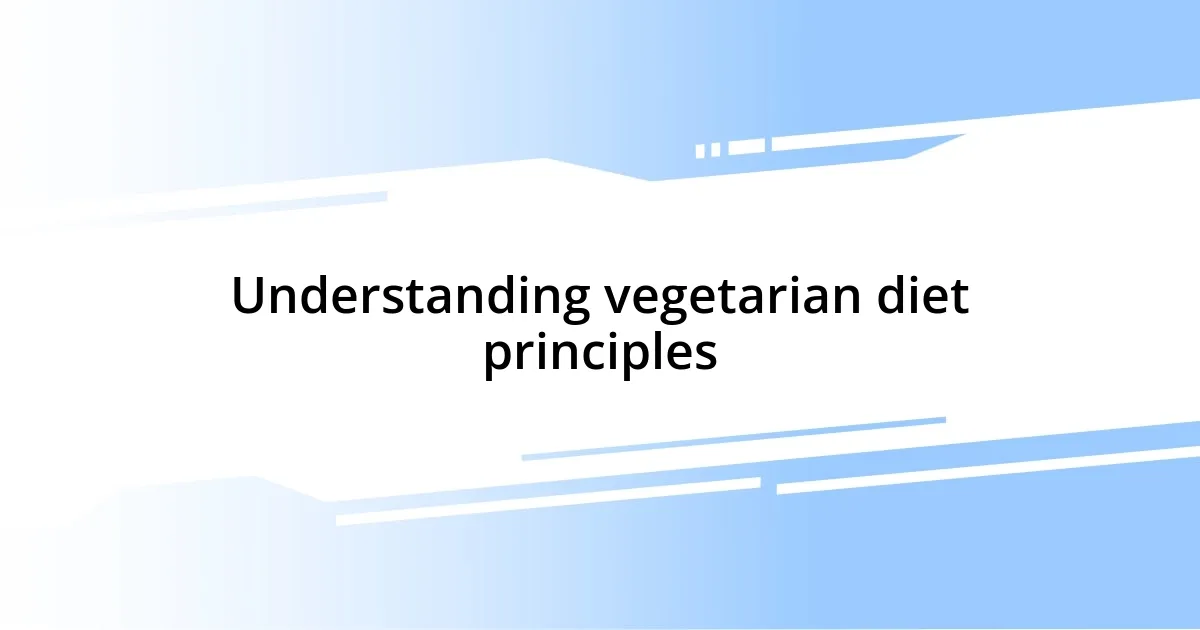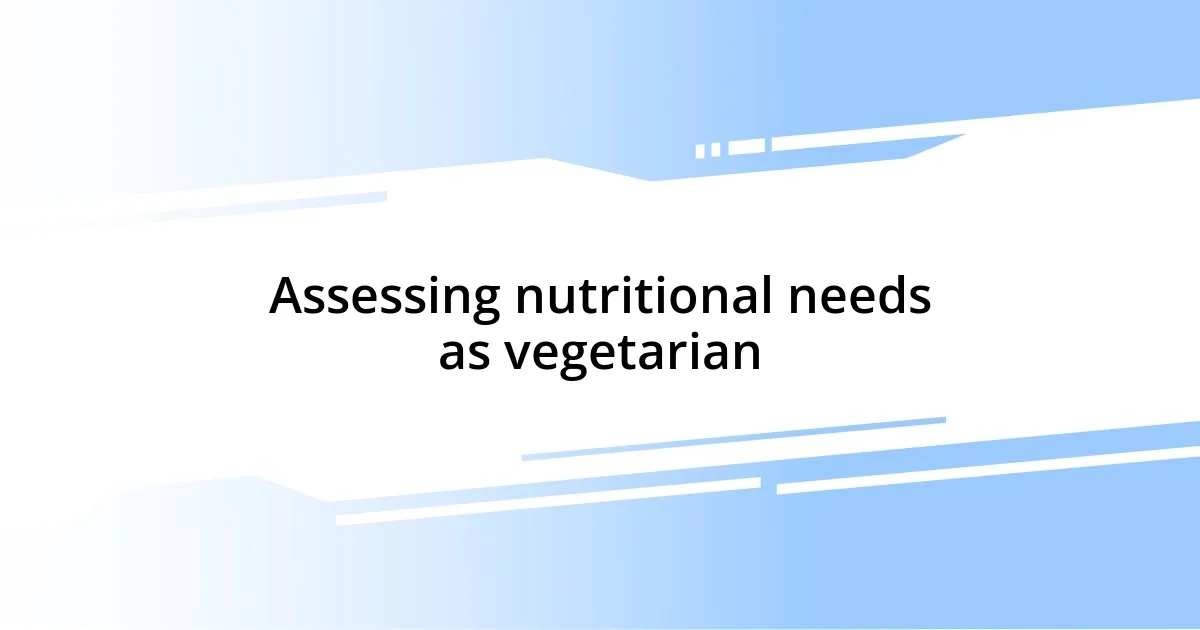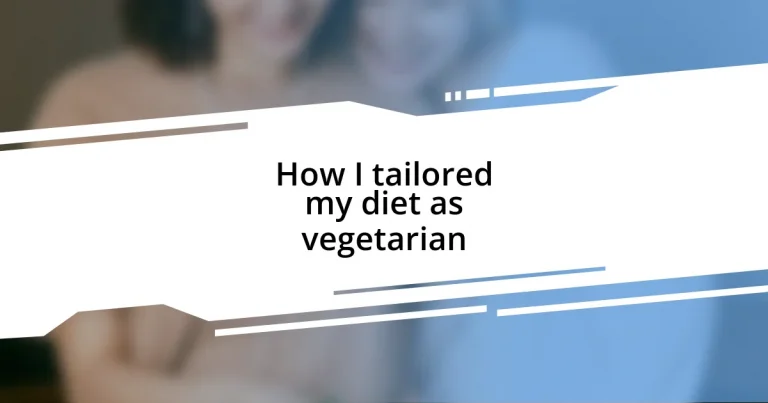Key takeaways:
- Emphasis on incorporating a variety of plant-based foods to enhance flavor, nutrition, and cooking creativity.
- Addressing nutritional needs through careful planning, focusing on key nutrients like iron, protein, and vitamin B12.
- Empowerment through active communication in social dining situations and simplifying meal prep for convenience.
- Regular health monitoring, including tracking dietary intake and routine blood work, to ensure nutritional adequacy and overall well-being.

Understanding vegetarian diet principles
The principles of a vegetarian diet revolve around plant-based foods, emphasizing the importance of fruits, vegetables, legumes, nuts, and whole grains. I remember the first time I tried to incorporate more legumes into my meals—it was both a challenge and a revelation. Have you ever tasted a perfectly spiced lentil curry? It’s not just about cutting out meat; it’s about discovering a vibrant world of flavors and nutrients.
Protein can often be a concern for those new to vegetarianism. I felt that initial worry myself, but I soon learned that there are abundant plant sources like beans, tofu, and quinoa. The transformation in my energy levels was significant, and I couldn’t help but wonder—how did I ever overlook the power of these foods before?
Understanding food labels became crucial for me as I navigated my vegetarian journey. I was surprised to discover how many everyday products contain hidden animal-derived ingredients. It’s a bit like being on a treasure hunt, where each find deepens your awareness and connection to what you eat. Have you ever checked a label and felt that moment of discovery? It’s these little insights that make the journey not only educational but also deeply engaging.

Assessing nutritional needs as vegetarian
Assessing nutritional needs as a vegetarian requires a thoughtful approach, as the absence of meat means we need to find alternative sources for key nutrients. I remember the first time I sat down to analyze my dietary intake; it felt a bit overwhelming. However, I found it essential to focus on nutrients like iron, vitamin B12, and omega-3 fatty acids, which can be more challenging to obtain on a plant-based diet. By incorporating fortified foods and supplements when necessary, I managed to strike a balance that supported my activity levels.
I also learned that protein isn’t the only nutrient to consider. The journey to understanding my nutritional needs included tracking my intake of vitamins and minerals through the use of apps. I still recall feeling a sense of achievement when I realized I was hitting my daily requirements for calcium by including sources like leafy greens and fortified almond milk. Have you ever felt that spark of satisfaction from taking control of your nutrition? It’s empowering, and it motivates you to keep exploring.
Here’s a quick comparison of nutrient sources for vegetarians versus omnivores that I found quite helpful during my dietary transition:
| Nutrient | Vegetarian Sources | Omnivore Sources |
|---|---|---|
| Protein | Beans, lentils, tofu, quinoa | Meat, fish, eggs, dairy |
| Iron | Spinach, lentils, chickpeas, fortified cereals | Red meat, poultry, fish |
| Omega-3 Fatty Acids | Flaxseeds, chia seeds, walnuts | Fatty fish, fish oil |
| Vitamin B12 | Fortified foods, supplements | Meat, dairy, eggs |
| Calcium | Leafy greens, tofu, fortified plant milk | Dairy products, leafy greens |

Choosing plant-based protein sources
Choosing the right plant-based protein sources was a game changer for me. At first, I was overwhelmed by choices like legumes, grains, and plant-based meats. However, I discovered that incorporating a variety of these sources not only added texture and taste to my meals but also ensured I was getting adequate protein. The relief I felt when I realized that black beans could be so versatile—from tacos to salads—was exhilarating.
Here are some excellent plant-based protein sources that you might consider:
- Beans: Black beans, kidney beans, and chickpeas are not only protein-rich but also packed with fiber.
- Lentils: These little powerhouses can be made into soups, stews, or even salads, giving a hearty texture.
- Tofu and Tempeh: I was amazed at how absorbing marinades transformed tofu into a delicious centerpiece.
- Quinoa: This grain is a complete protein and is fantastic in bowls or as a side dish.
- Nuts and Seeds: Almonds, chia seeds, and hemp seeds add a delightful crunch and are great for smoothies.
- Peas: I love using split peas in a cozy soup; they’re not just protein-packed but also so comforting.
Experimenting with these options not only nourished my body but also sparked joy in my cooking. Each meal felt like a celebration of creativity, showing just how rewarding a plant-based diet can be. There’s something really fulfilling about crafting a dish from scratch, knowing it’s not just good for my health but also bursting with flavor.

Incorporating variety in meals
Incorporating variety in my meals has been a delightful journey that keeps my taste buds eager for what’s next. I remember the first time I mixed roasted sweet potatoes with black beans and a zesty lime dressing. The explosion of flavors was such a revelation that I realized how enjoyable and colorful a vegetarian plate could be. Whenever I find myself in a meal rut, I challenge myself to explore a new ingredient. Have you tried cooking with tempeh or experimenting with different spices? Those simple changes can elevate an ordinary dish into something extraordinary.
It’s amazing how variety can also influence my mood and energy levels. I’ve discovered that sourcing ingredients from different cuisines not only enriches my palate but also broadens my culinary skills. One week, I embraced the vibrant colors of Mediterranean dishes with falafel and tabbouleh. The next, I ventured into the spicy world of Indian cooking with chickpea curry and basmati rice. Each meal feels like a mini-adventure. How does it feel for you to change things up in the kitchen? For me, it injects enthusiasm into my cooking routine.
Going beyond just flavor, I’ve found variety helps me maintain a balanced nutrient intake. Mixing up my meals ensures I access a broader spectrum of vitamins and minerals. For instance, last night, I made a stir-fry with broccoli, bell peppers, and cashews, which packed in not just tastes but also critical nutrients. When I focused on diversity, I felt not only physically invigorated but mentally refreshed, eager to face the day ahead. It just goes to show how a little creativity can go a long way in making our healthful choices both exciting and nourishing.

Addressing common vegetarian challenges
One of the biggest challenges I faced as a vegetarian was getting enough iron. Early on, I experienced fatigue and wondered why I felt so drained. Then I learned about iron-rich plant foods like lentils, spinach, and fortified cereals. Pairing these with vitamin C sources, like oranges or bell peppers, enhanced absorption, which really transformed how I felt. Now, when I make a hearty lentil soup, I add a side of citrus salad, and the boost it gives me is both uplifting and energizing.
Another common hurdle is navigating social settings, especially when dining out or attending gatherings. I’ve been at restaurants where the vegetarian options seemed limited, leaving me feeling either frustrated or underwhelmed. But instead of settling for a bland salad, I started speaking up. I learned that many chefs are happy to modify dishes or accommodate requests. I recall a time when I asked a waiter if they could swap chicken for roasted vegetables; the dish turned out to be the highlight of my evening! Speaking up made me feel empowered and opened my eyes to the creative possibilities.
Lastly, I struggled with the misconception that being vegetarian meant I had to give up on convenience. Initially, I thought meal prep would be overwhelming, but I quickly found that it was quite the opposite! Simple solutions like batch-cooking grains or chopping veggies for the week saved me so much time. Now, when I walk into my kitchen and see jars of prepped ingredients, it feels like stepping into my own little culinary haven. Isn’t it satisfying to know that with a little planning, I can enjoy healthy, homemade meals without the stress? Embracing this aspect of my vegetarian journey has not only simplified my life but, more importantly, allowed me to prioritize my health without sacrificing time or flavor.

Monitoring health and progress
Monitoring my health and progress as a vegetarian isn’t just something I do sporadically—it’s become a routine that deeply impacts how I feel day to day. I started using a food diary app to track my meals, which turned into an eye-opening experience. When I reviewed my food logs, I noticed patterns, like days I felt sluggish often coincided with higher processed food intake. Isn’t it fascinating how our bodies can communicate so clearly about what’s working and what isn’t?
Regular check-ins with my energy levels and mood have also been crucial. I can’t tell you how many times I’ve had to pause and ask myself—am I eating enough diverse foods? I’ve learned that when I incorporate enough variety, I not only feel physically better but also mentally sharper. For example, after a week filled with legumes and greens, I noticed a significant uptick in my focus during my work tasks. It’s like unlocking a new level of productivity. Have you ever felt that connection between your diet and your mental clarity?
Additionally, I prioritize my visits to the doctor for routine blood work, particularly to check my vitamin B12 and iron levels. In the beginning, I was hesitant, but now it feels empowering to equip my health journey with evidence-based insights. The peace of mind I gain from understanding my nutrient levels enables me to make informed decisions about my meals. Wouldn’t you agree that knowing exactly where you stand health-wise makes it easier to adjust? I remember a moment when my B12 levels were low, and I promptly added fortified foods to my diet, transforming my energy levels almost overnight. It’s those insights that reinforce the importance of regular health monitoring in this vegetarian lifestyle.












